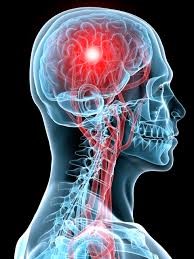
A concussion is a brain injury and is serious, just like other head injuries. Concussions can be caused by a quick twisting motion of the head, sudden deceleration/acceleration movements, an unexpected blow to the head, or by an abrupt blow to another part of the body that causes forces transmitting to the head. A concussion cannot be seen and 90% of them occur without loss of consciousness. Signs and symptoms may show up right after the injury or can be delayed hours or days later. If not managed properly, concussions may result in further life complications including brain damage and in rare cases, even death. Even a “ding” can potentially be serious. If an athlete shows or reports any signs and symptoms of concussion, they will be removed from play immediately! The athlete will be further evaluated by the certified athletic trainer. It is important to speak up, especially if a concussion has gone unnoticed.
All suspected head injuries must be referred to the certified athletic trainer immediately! At no time may a coach decide about a student-athlete’s playing ability after a head injury.
If an athlete sustains a concussion, they are required to have the Post Head Injury/ Concussion Initial Return To Participation form signed signed by a physician before they can begin the return to play protocol. Once the return to play protocol has successfully been completed, then page 2 must be signed by a physician to allow the athlete to return to full participation. If an athlete is referred to a physician, they will not be allowed to play until they have been seen by one. If an athlete needs assistance seeing a physician, let the certified athletic trainer know asap.

Signs and Symptoms of Concussion:
Loss of Consciousness (Rarely)
Headache
“Pressure in Head”
Neck Pain
Ringing in Ears
Nausea or Vomiting
Dizziness
Blurred or Double Vision
Balance Problems
Sensitivity to Light or Noise
Feeling Slowed Down
Feeling like in a “Fog”
Just “Don’t Feel Right”
Difficulty Concentrating or Remembering
Fatigue or Low Energy
Confusion
Drowsiness
Trouble Falling Asleep
More Emotional
Irritability
Sadness
Nervous or Anxious
Studies have shown that it takes on average 10-14 days for signs and symptoms of a concussion to resolve and if the athlete has sustained multiple concussions they can last longer.
Any athlete suspected of suffering a concussion should:
Be removed from physical activity asap.
Be evaluated by the certified athletic trainer.
Complete the AT-18 form to return to full participation.
No athlete may return to physical activity after a concussion without written medical clearance from a physician.
In Florida, an appropriate health care provider to clear athletes from concussions are licensed physicians (MD, as per Chapter 458 of the Florida Statutes), a licensed osteopathic physician (DO, as per Chapter 459 of the Florida Statutes).
What are the dangers of sustaining a concussion?
Athletes with signs and symptoms of a concussion should be removed from physical activity immediately! Continuing to play with signs and symptoms of a concussion can leave an athlete susceptible to sustaining Second-Impact Syndrome. Athletes who sustain a second concussion before the symptoms of the first concussion resolve are at-risk for prolonged concussion signs and symptoms, permanent disability, and even death. There is evidence that multiple concussions can lead to long-term symptoms including early dementia.
Parents, coaches, and athletes should be aware of preliminary evidence that suggests repeated concussions may lead to abnormal brain changes (Chronic Traumatic Encephalopathy) which can only be seen on autopsy. There have been case reports suggesting the development of Parkinson’s Disease, Amyotrophic Lateral Sclerosis, Severe Traumatic Brain Injury, and long-term depression and memory issues may be related to concussion history.
Further research on this topic is needed before any conclusions can be drawn.
